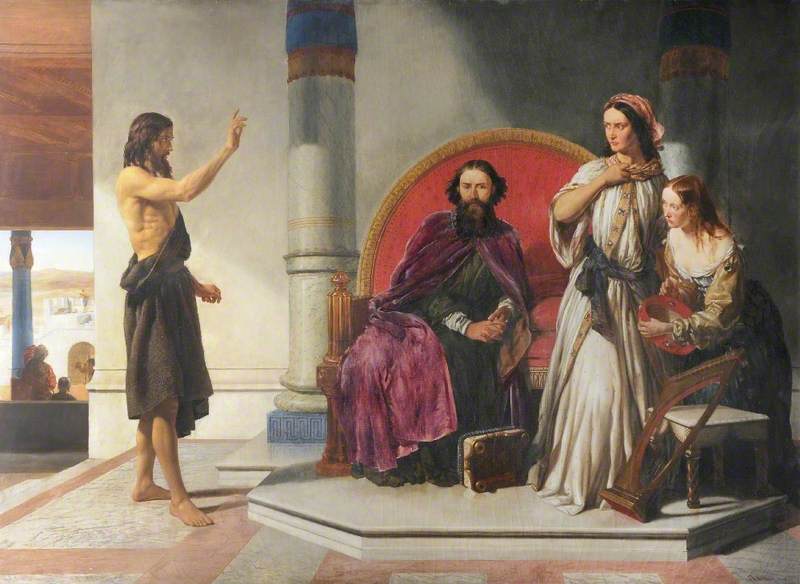Readings: Deuteronomy 18:15–19 | Philippians 4:4–7 | John 1:19-28
Text: John 1:19-28
There is something diabolical in us that fears that John the Baptist will ruin Christmas. He disrupts things. John is not here to help you have fun. Rather, he is trying to help you prepare for the Last Day and the Lord’s return.

In that office, he is prone to notice inconvenient things, such as when people are living together outside of marriage. In fact, this is what Herod Antipas would behead him for. He tried to warn Herod, but Herod didn’t want to be warned. He wanted to live with his brother’s wife as though she were his wife. It would have been fine if John had secretly disapproved but not spoken against it out loud. He could have remained silent, saying to others that even though he personally disapproved of Herod’s lifestyle, it was sadly what people do these days, and the main thing was to keep up appearances, to not make waves because he loved Herod no matter what. It would have been fine if John disliked what they were doing deep in his heart, secretly, because he preferred the old ways, but at the same time if he would do everything he could to pretend as though Herodias, the wife of Herod’s brother, was a legitimate wife to Herod. If he would have just avoided making them uncomfortable. Then he could have lived and probably even been rewarded.
But not John. John wouldn’t do that. He was more concerned with Herod and Herodias’ eternal fate, with the damage and pain that their infidelity was causing, than he was with being liked by him or even living.
Now, if your goal this Christmas is to create warm, life-long memories for your family, then don’t be like John. The secret to a Christmas without controversy or pain is to avoid all topics of any weight or seriousness and certainly don’t warn sinners of the danger of their sins. Don’t talk about anything that matters. Stick to clichés about how much you love your family and how special they are. Make sure that no one feels judged. Encourage people in their defilements and they will like you. And then you’ll never be accused of the most unforgivable of all sins: taking yourself too seriously. Agree with their blasphemy, their perverse and uninformed opinions, and they might even call you wise.
To create life-long, warm family memories, focus on the food and gifts and sentimentality. You can say it is Jesus’ birthday if you want, but keep Him in the manger and on the greeting card; off the cross and off the altar. Hide Him under a Christmas tree. Make sure the real focus is presents, fun, and family. By all means, don’t let Jesus speak. Don’t contemplate His sorrows and self-giving on the cross. For warm family memories, keep Jesus and the Prophets silent and nothing like John. Go the church, but do it for the candles, the nostalgia, and the “time together.” Then drown your conflicted conscience with an extra helping of egg nog.

The problem with those sorts of memories is they don’t bring any comfort in Hell. The good memories of having the good opinion of your loved ones and friends is nice while it lasts. It is not fun to be thought a bigot or arrogant by your family at Christmas time, and certainly to lose access to your grandchildren. But those things, at worst or best, only lasts as long as this life.
Can you imagine knowing the truth about our children and not warning them because we feared they would withdraw from us and then have them curse us from Hell because we cared more about a moment’s pleasure or a conflict-free Christmas than we did for their eternal fate? May God protect us from such cowardice! And may God preserve us from losing the opportunity to speak to them!
Despite the discomfort it might bring, invite John the Baptist to your Christmas dinner. Let him speak the truth in love—to say what hurts, what is inconvenient, but necessary. Let him say it with compassion and kindness. Not just because it is right but also because in the long run it is worth it.
This is the testimony of John, when the Jews sent priests and Levites from Jerusalem to ask him, “Who are you?” 20 He confessed, and did not deny, but confessed, “I am not the Christ.” 21 And they asked him, “What then? Are you Elijah?” He said, “I am not.” “Are you the Prophet?” And he answered, “No.” 22 So they said to him, “Who are you? We need to give an answer to those who sent us. What do you say about yourself?” 23 He said, “I am the voice of one crying out in the wilderness, ‘Make straight the way of the Lord,’ as the prophet Isaiah said.”

But, of course, John himself is not coming back from the dead. As we heard him, say, he is not Elijah the Tishbite come back. So, you’re going to have to do this yourself. You are going to have to “confess, and not deny, but confess.” Maybe your kids will be outraged and go crazy if you warn them about the dangers of fornication or homosexuality or the necessity to be in Church more regularly than they change the batteries in their smoke detector. But will they really be surprised by these ideas?
Is this a change from what you used to think? Is it different from how you raised them? If so, then repent to them and tell them you were wrong and you’re sorry for that, and want to do better from here on out. I know there is risk, but will they not love you even if they disagree with you? I certainly hope they will. I hope they are not so petty and manipulative, or that you are not so desperate, that you must bribe them with your silence and pretend approval or that you must placate them with lies for the sake of a pretend peace even if it is harmful to them.
I think we can do better – by grace, in humility, for the sake of love. Every family is different. We all have baggage and dysfunction. But it is possible to speak civility and to actually talk about things that matter because they matter. This isn’t to cast stones for unfaithfulness. There is risk in speaking the truth to anyone who is caught up in his or her sin.
But sometimes Dad needs to be told to put down his phone and pay attention to his children, or Mom needs to be told that no one needs a third glass of wine, or your friend needs to be told that he is not being fair to his parents. If you love people, the risk is worth it. If we were talking about how to please customers because we want their money, how to win friends and influence people this would be a different conversation, but we are talking about how to live together in love according to God’s Word. This is about actually looking out for one another, not trying to manipulate one another.

Who hasn’t been afraid of the outburst a drunk friend will make if you suggest that he not drive or that you will look judgmental? But at the same time, who wants to go to that friend’s funeral and face his widow having made no attempt at all to stop him? None of us. We speak the truth because we think we are better than others. We do it because we love others.
So also John the Baptist is unfairly characterized as all Law. But his fiery calls to repentance are matched by a Baptism of forgiveness. His stern words to the priests and Levites and Pharisees are balanced by his welcoming of Gentiles. He not only warns of the day of wrath, he also points to the Lamb of God who takes away the sin of the world. Speak the whole truth of the God’s Word to your loved ones, Law and Gospel, ethical admonition and rebuke along with encouragement and confidence in God’s love and goodness in Christ.
22 So they said to him, “Who are you? We need to give an answer to those who sent us. What do you say about yourself?” 23 He said, “I am the voice of one crying out in the wilderness, ‘Make straight the way of the Lord,’ as the prophet Isaiah said.”
John is a voice crying in the desert: “Make straight the way of the Lord.” Making the way straight isn’t John’s job; it is theirs. He is crying out to them. He is telling them, the priests, in light of the coming day of wrath, that they are to comfort the repentant, to embrace the Messiah, to recognize Him in their midst because He has come to save them and He fulfills the Law and the prophets. He cries to the priests and to us: “You there, make straight the way of the Lord. I can’t do it for you. You need to repent and believe.” John is there not only to kill with his Baptism but also to make alive through faith by the fire of the Holy Spirit. The Messiah comes to us and join us to Himself. He comes to make atonement, to spare us the punishment of our sins, to be our God.

That sort of preaching and witness doesn’t ruin Christmas. It is Nativity of Our Lord. It will not be ruined either by angry people or ignorant, self-righteous people, or by broken families and a lifetime of regret. Christmas is not defined by our failures or our imperfect families. Despite what we are told, the traditions are not the substance of Christmas. Christmas is not defined by us, nor is it defined by food and tradition and the making of memories. Christmas is defined by Christ who came to us and for us as the gift of the Father to be our righteousness and redemption.
The world is evil. Our flesh is weak. Our families are a mess. But in His Nativity, the Lord Jesus has joined us. He is with us as one of us. He has lived the sinless life we ought to. It was a not a life free of conflict and betrayal. That life is a lie of the devil. Our Savior has gone before you and I in confessing the truth. It is His truth that He puts on our lips. He has died and He is risen. He takes away the sins of the world. He is Christmas.
So, you who mourn beneath sorrow’s load, whose children and loved ones have not lived up their promises, whose parents have failed them, you who are fearful or lonely or ridden with guilt: The Messiah comes for you. He comes with healing in His wings [Malachi 4:2]. His Father is well-pleased, and that is what brings you peace, comfort, and joy [Romans 5:1].
Make straight the way of your heart for Him. Lift it up to Him. Ponder nothing earthly-minded. Rest in His grace in His Holy Sacrament: “Take; eat. This is My Body given for you…Take; drink. This is My Blood shed for you for the forgiveness of your sins.” The Lord has prepared His way into your heart and mind. Christ speaks in His Word and you hear His voice. He hides Himself in bread and wine, in water, and in your neighbor. You know Him and see Him by faith. These hard times and heartache won’t last. These embarrassments and worries won’t last. These jealousies and hurts won’t last. Jesus will. He lasts. He endures. He does not fade. His communion with you will last because it is everlasting. “O Come, Thou Dayspring from on high, And cheer us by Thy drawing night; Disperse the gloomy clouds of night, And death’s dark shadows put to flight.” (LSB 357:6) Amen.

Original sermon by Rev. David Petersen, Fort Wayne, Ind. with edits

Leave a Reply